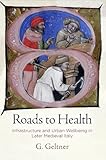Roads to Health : Infrastructure and Urban Wellbeing in Later Medieval Italy / G. Geltner.
Material type: TextSeries: The Middle Ages SeriesPublisher: Philadelphia : University of Pennsylvania Press, [2019]Copyright date: ©2019Description: 1 online resource (320 p.) : 20 illusContent type:
TextSeries: The Middle Ages SeriesPublisher: Philadelphia : University of Pennsylvania Press, [2019]Copyright date: ©2019Description: 1 online resource (320 p.) : 20 illusContent type: - 9780812296310
- City dwellers -- Health and hygiene -- Italy -- History -- To 1500 -- Case studies
- Public health laws -- Italy -- History -- To 1500 -- Case studies
- Public health -- Italy -- History -- To 1500 -- Case studies
- Urban health -- Italy -- History -- To 1500 -- Case studies
- HISTORY / Medieval
- Caregiving
- Ecology
- Environmental Studies
- Health
- History
- Medicine
- Medieval and Renaissance Studies
- 362.1/0420937
- online - DeGruyter
| Item type | Current library | Call number | URL | Status | Notes | Barcode | |
|---|---|---|---|---|---|---|---|
 eBook
eBook
|
Biblioteca "Angelicum" Pont. Univ. S.Tommaso d'Aquino Nuvola online | online - DeGruyter (Browse shelf(Opens below)) | Online access | Not for loan (Accesso limitato) | Accesso per gli utenti autorizzati / Access for authorized users | (dgr)9780812296310 |
Browsing Biblioteca "Angelicum" Pont. Univ. S.Tommaso d'Aquino shelves, Shelving location: Nuvola online Close shelf browser (Hides shelf browser)

|

|

|

|

|

|

|
||
| online - DeGruyter The Matter of Virtue : Women's Ethical Action from Chaucer to Shakespeare / | online - DeGruyter Knights, Lords, and Ladies : In Search of Aristocrats in the Paris Region, 1180-1220 / | online - DeGruyter Shareholder Cities : Land Transformations Along Urban Corridors in India / | online - DeGruyter Roads to Health : Infrastructure and Urban Wellbeing in Later Medieval Italy / | online - DeGruyter Hutu Rebels : Exile Warriors in the Eastern Congo / | online - DeGruyter The Prosthetic Tongue : Printing Technology and the Rise of the French Language / | online - DeGruyter Heroines and Local Girls : The Transnational Emergence of Women's Writing in the Long Eighteenth Century / |
Frontmatter -- Contents -- List of Illustrations -- A Note on Dates, Currencies, Wages, and Prices -- Rome, 1306: A Prologue -- Introduction -- Chapter 1. Roads to Health -- Chapter 2. Lucca’s Viarii -- Chapter 3. Bologna’s Fango Officials -- Chapter 4. Piedmont’s Camparii -- Chapter 5. Healthscaping in Medieval Europe and the Premodern World -- Conclusion -- Appendix 1. Fines to Be Imposed by Lucca’s Roads Masters -- Appendix 2. Text and Translation of Vernacular Promulgations by Lucca’s Roads Masters -- List of Abbreviations -- Notes -- Bibliography -- Index -- Acknowledgments
restricted access online access with authorization star
http://purl.org/coar/access_right/c_16ec
In Roads to Health, G. Geltner demonstrates that urban dwellers in medieval Italy had a keen sense of the dangers to their health posed by conditions of overcrowding, shortages of food and clean water, air pollution, and the improper disposal of human and animal waste. He consults scientific, narrative, and normative sources that detailed and consistently denounced the physical and environmental hazards urban communities faced: latrines improperly installed and sewers blocked; animals left to roam free and carcasses left rotting on public byways; and thoroughfares congested by artisanal and commercial activities that impeded circulation, polluted waterways, and raised miasmas. However, as Geltner shows, numerous administrative records also offer ample evidence of the concrete measures cities took to ameliorate unhealthy conditions. Toiling on the frontlines were public functionaries generally known as viarii, or "road-masters," appointed to maintain their community's infrastructures and police pertinent human and animal behavior. Operating on a parallel track were the camparii, or "field-masters," charged with protecting the city's hinterlands and thereby the quality of what would reach urban markets, taverns, ovens, and mills.Roads to Health provides a critical overview of the mandates and activities of the viarii and camparii as enforcers of preventive health and safety policies between roughly 1250 and 1500, and offers three extended case studies, for Lucca, Bologna, and the smaller Piedmont town of Pinerolo. In telling their stories, Geltner contends that preventive health practices, while scientifically informed, emerged neither solely from a centralized regime nor as a reaction to the onset of the Black Death. Instead, they were typically negotiated by diverse stakeholders, including neighborhood residents, officials, artisans, and clergymen, and fostered throughout the centuries by a steady concern for people's greater health.
Mode of access: Internet via World Wide Web.
In English.
Description based on online resource; title from PDF title page (publisher's Web site, viewed 21. Jun 2021)


